In Conversation: Will McPhail, New Yorker cartoonist on his debut graphic novel ‘In’.
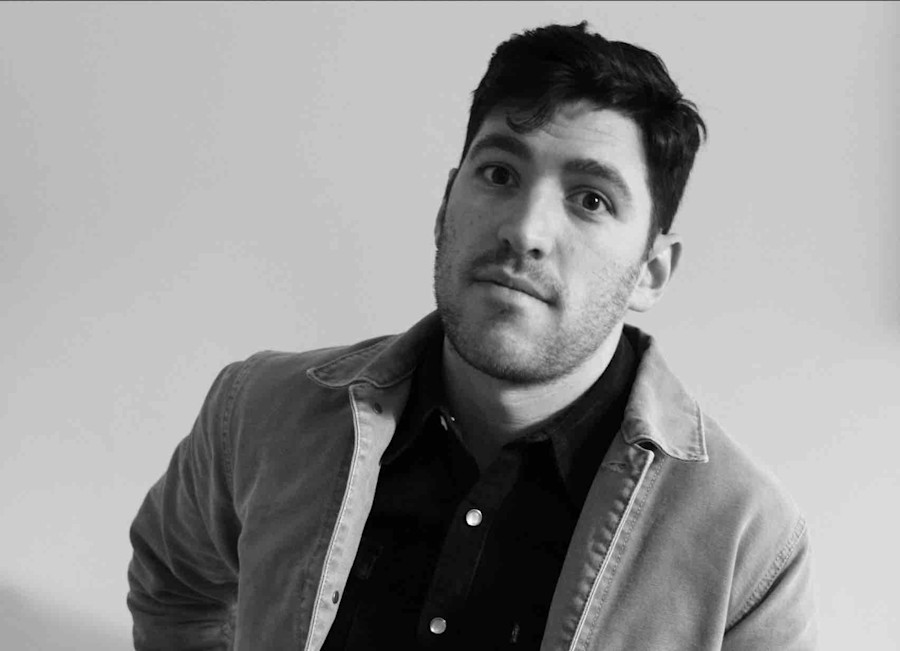
Will McPhail is a writer and cartoonist from Lancashire who lives in Edinburgh. His work in the New Yorker has earned him the Reuben Award’s Cartoonist of the Year award for the last two years running and attracted an extensive social media following due to it’s punishingly accurate portrayal of the world at large. He has also been published in Private Eye and the New Statesman and was winner of the British Cartoonists Association’s Young Cartoonist of the Year in 2013.
In his debut graphic novel In, McPhail explores the mundane social performance we play each day and one man’s attempt to break free of it. It’s a sensitive and emotionally impeccable exploration of McPhail’s trademark single-frame humour, stretching the illustrations into several hundred pages of long-form, experimental, heartbreaking genius. It’s graphically inventive, emotionally provocative storytelling at it’s finest, and a wonderful evolution of McPhail’s already acclaimed craft.
This is a long discussion, covering McPhail’s wry observation of the world through to the process of breaking free from a short-form style into a much longer one.
In by Will McPhail is out now through Hachette.
In by Will McPhail is out now through Hachette.
Chris Barker: Will, hi!
Will McPhail: Hi!
Your book came out yesterday. We can talk about it if you want. Is there anything you want to talk about?
We can talk about the fact I’m wearing my pyjamas in my kitchen right now. These nice tartan pants.
You’re the first comic artist I’ve interviewed so as far as I’m aware this is the official uniform of your profession.
Oh no, I’m setting the baseline.
Does that concern you?
Yes, this is a terrible idea.
OK, we don’t have to talk about it. Let’s talk about the creative process.
Well I’ve just outlined the two key elements of it. First you have a hangover, then you put on your pyjamas…
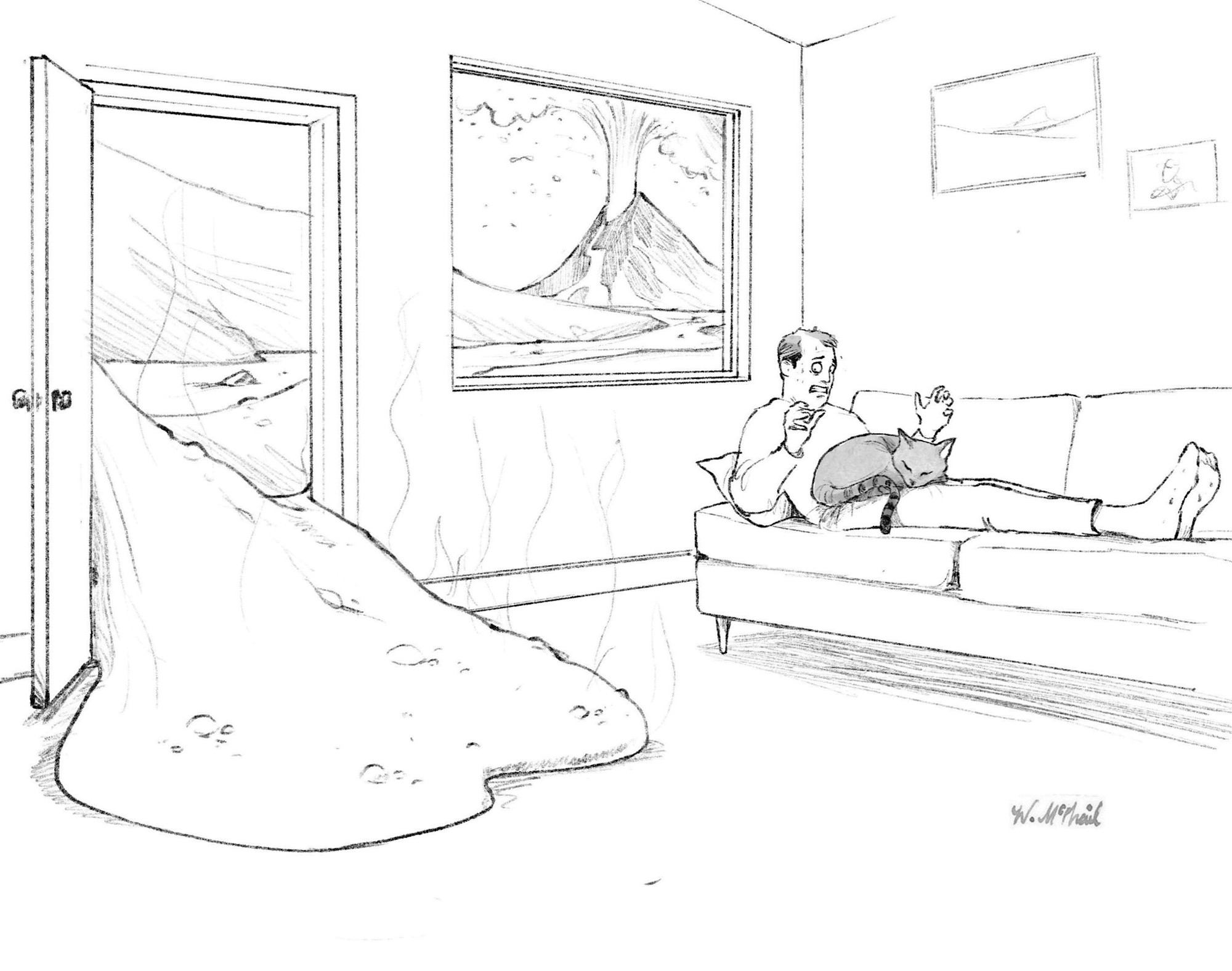
Ok, so we’re done here then. The book came out yesterday, just a casual two-year project. How are you feeling?
Very good, thank you! I’m excited for everybody to finally see the book, and that it has revealed to not be an enormous prank at my expense. That’s what I thought it was for a long time.
And how are you spending day one of freedom?
Well, I’m just looking out my window. I live opposite a Kebab shop called [REDACTED], which is either the best thing or a bad thing. They’ve given me food poisoning twice which I mean, give me food poisoning once shame on them. Give me food poisoning twice….well, shame on them to be honest. I should be able to go have a donor kebab and not have it ruin my day. But the reason I want to talk about them is that I’m convinced they’re a front for a drug den.
Funny you say that, I just realised my neighbour is a drug dealer too! The jig was up once a friend bought a bag of weed from there.
I haven’t gone that far yet, but all the workers show up in the most incredible cars, and they’re shaving off donor meat wearing these lovely suits.
Have you ever considered that maybe you’re just funding their incredible lifestyles?
Probably! I would go in to get a kebab and say ‘no give me the real stuff.’ And they would look at me blankly, so I haven’t been let into their inner-circle yet.
Tell me about supermarkets. I know you’ve just released the biggest, most important piece of work in your life, but this is where it all began, right?
OK, here we go. Before I got into cartoons and writing and this life, I worked in pretty much every chain of supermarkets in the North of England. This was both before I went to University and throughout University to help pay for it. I’d go and work seasonal jobs in Easter and Christmas and whatever. And I was let go from all of them! Well, they just politely said I ‘don’t have to come back anymore’.
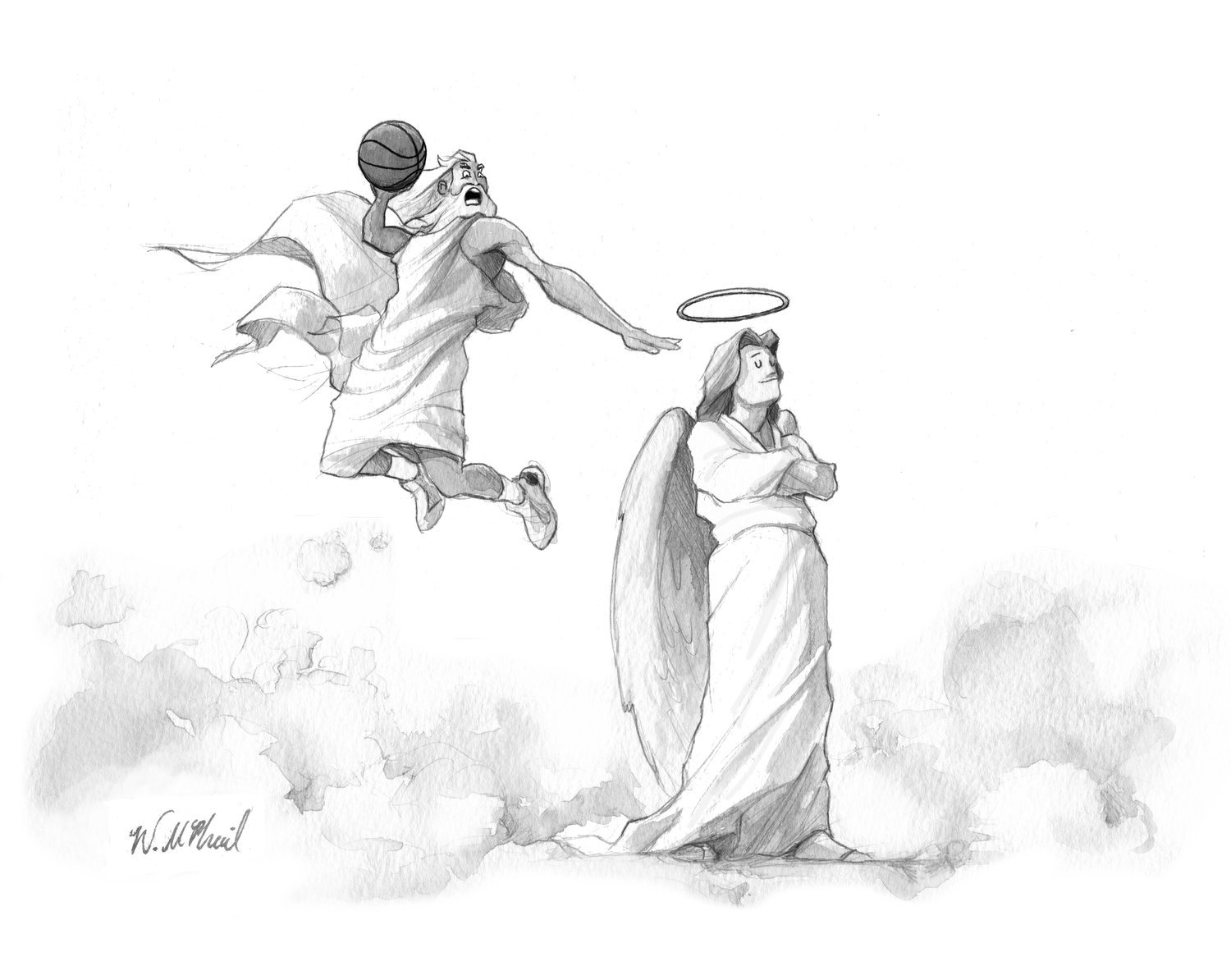
Was there a consistent reason as to why?
I think my heart wasn't in it, to be honest. When I was working at Asda (after I got sacked by Tesco), I was working the trolleys which I really liked. Wait, do they call them trolleys in Australia?
They do.
Ok, they do. Anyway that was lovely because I was drawing cartoons on the side, so I was just wandering around outside and thinking of ideas and people would leave me alone. I was pretty happy doing that for a long time. But then they started putting me on checkouts where I would mess around and not concentrate and go distract other people, so they started putting me on the last checkout facing the wall where I wouldn’t interact with anyone.
I used to get so bored I would leave notes in the checkout for people to find. But I would pick an item that would be in the shop, like an avocado or a packet of Haribo, and try and will that item through my checkout through the power of thought. I would start by seeing like ‘whose the kind of person that would buy an avocado’ and try and attract them to my checkout, then I would celebrate while the rest of the shopping piled up. I was eventually let go from there.
I got a lot of warnings. I remember when they got me into the office and were writing a transcript of the conversation, so I would say things like ‘Karen, put your blouse back on!’ so they had to write it down. Then they started reading out quotes of mine, like things I’d said to other employees. ‘19th April: Will McPhail was told that he should adhere to the eight trolley rule. Will McPhail said he laughs in the face of the eight trolley rule!’ I was laughing my head off. And then they recorded that I was laughing in the minutes! I couldn’t believe my luck.
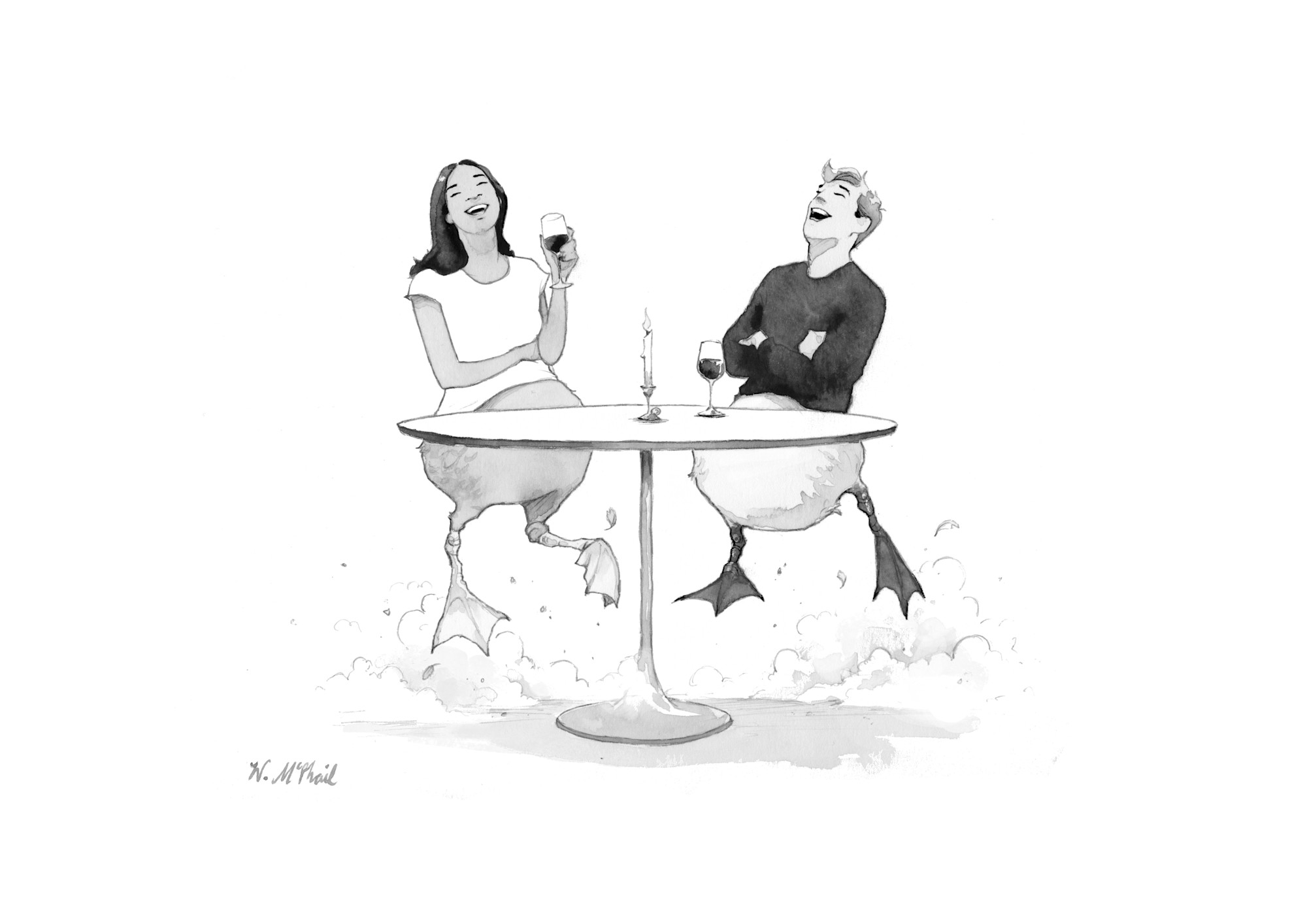
You need to go back with some copies of the book like ‘this is what you did’.
I know! Anyway, I was fired from Tesco because I flooded the cafe. I left the taps on while I went upstairs to watch Man United in a penalty shootout against Chelsea. You have to have proper terrible jobs when you’re young.
Yeah, the reason I’m asking is because I thought perhaps the monotony of boring jobs is where observation becomes magnified. Do you think you were consciously observant then?
Yeah, there was definitely some of that at play. But it’s been my whole life to be honest and it’s something I tackled in the book; being observant and always thinking before speaking. It’s a double-edged sword because it’s the tool I’ve used to create everything I’ve ever drawn but it’s also the thing that isolates you the most. This tendency to be on the outside looking in all the time, it can be sad. It isolates you and separates you from the thing you’re wanting to take part in.
Yeah, there was definitely some of that at play. But it’s been my whole life to be honest and it’s something I tackled in the book; being observant and always thinking before speaking. It’s a double-edged sword because it’s the tool I’ve used to create everything I’ve ever drawn but it’s also the thing that isolates you the most. This tendency to be on the outside looking in all the time, it can be sad. It isolates you and separates you from the thing you’re wanting to take part in.
I agree. I think you risk seeing yourself as above everyone but I’m always wondering if there is someone out there observing and making fun of me too.
Yeah. Yeah. It's an arrogance. It really is to assume that you are this sort of Godly figure looking down on everybody.
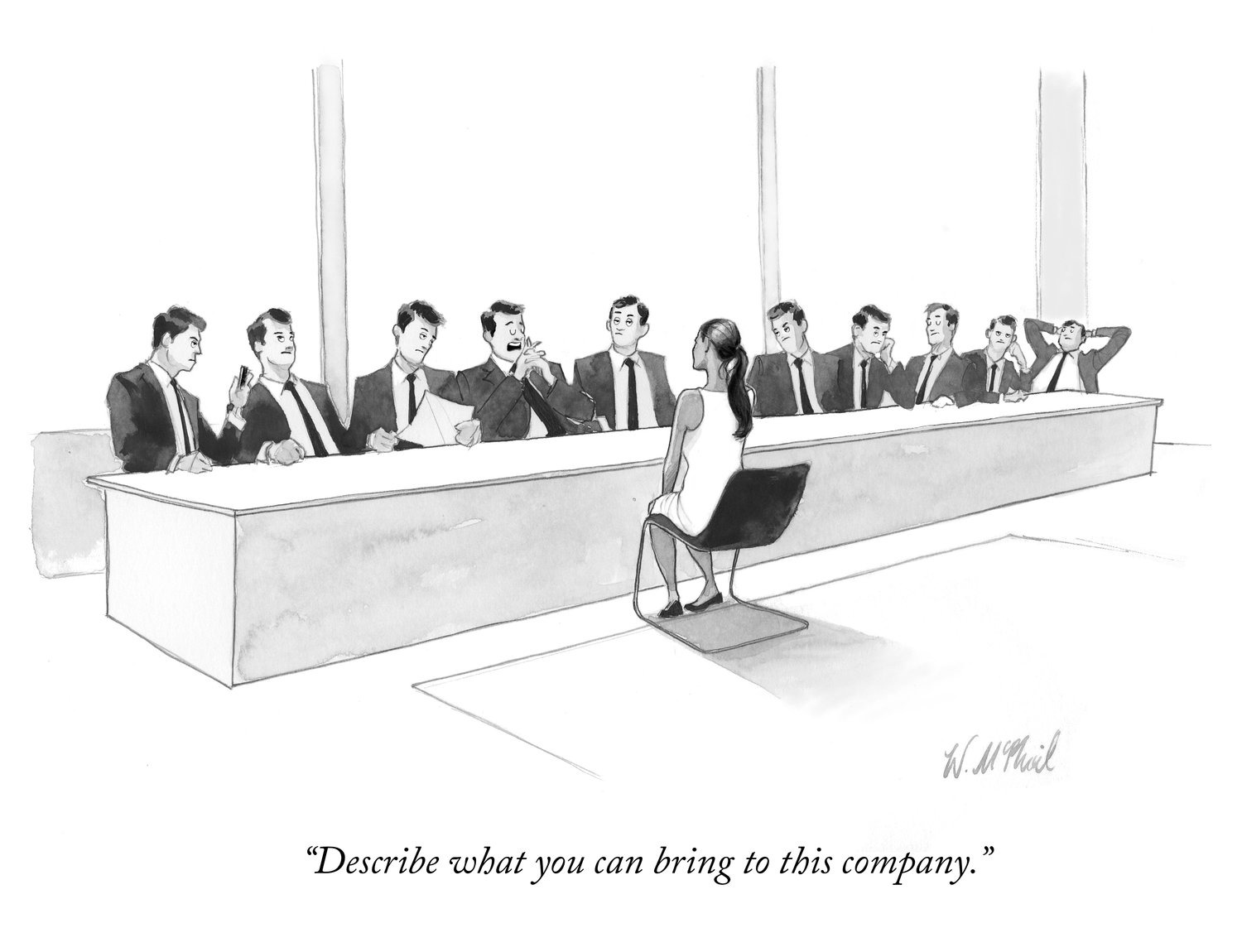
But I would say there isn’t a nastiness in your work. It’s not making fun of any particular individual, just particular habits.
I definitely hope it doesn't come across as nasty. Something that forced myself to be more present on the internet (as in myself and not my work) is that I hope to get across this idea that a lot of my jokes are self-deprecating and that I’m the person the cartoon is depicting. If people know me a little more they’ll know I’m the butt of most of the jokes.
Was there a point where you realised you could translate these common but unspoken insights and turn them into something that resonated?
If it exists I can’t think of it. I don’t know. I remember early on that the friends that I thought were the funniest would say that I was the funny one in the group. And I was like ‘Oh Jesus, am I?’ In a professional sense, I guess getting my first cartoon into the New Yorker was a big deal. Like ‘OK I am doing something that’s relatable.’
I agree that getting into the New Yorker IS relatable.
Nooo, that’s not what I meant!
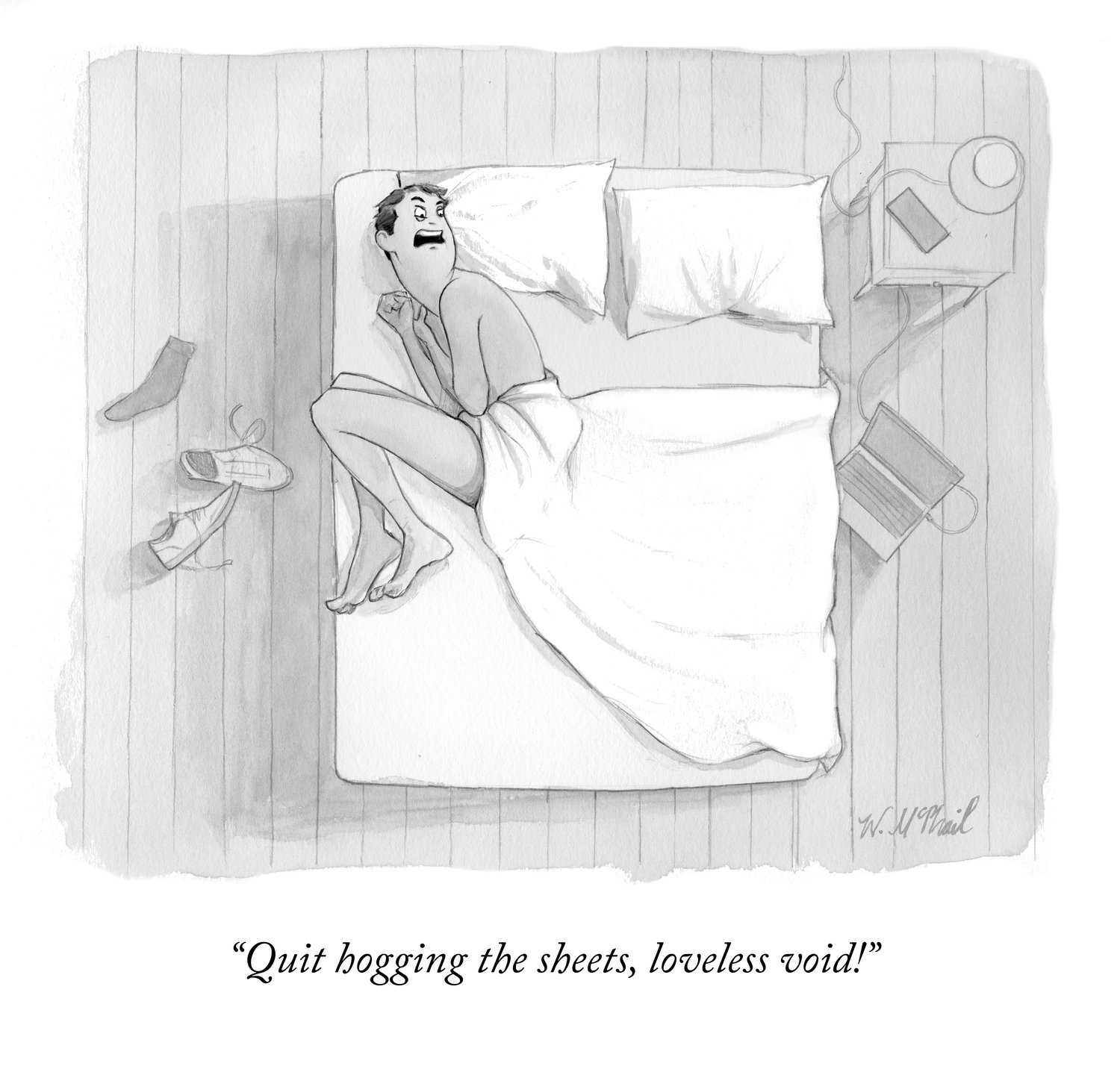
I only really have one question about the New Yorker stuff because I assume it’s what you get asked about the most. I’ve heard that the process of getting a cartoon published is quite difficult, like an exercise in constant rejection. How do you deal with that?
I guess it just becomes like water off a duck’s back. I really don’t feel it anymore. It’s part of the deal and it actually improves how you work because you’re forced to keep this kind of improvisational mindset that allows you to keep coming up with ideas no matter how many get rejected.
Actually, it’s a lie saying it’s water off a duck’s back. In each batch there’s cartoons you care about and some you don’t and you do hope they take the ones you do care for and when they don’t you feel it. Everyone’s said a million times that the failures should be celebrated and cherished because the next thing will be better because of them. But then the next thing gets rejected too, so you’re left wondering...
Y’know when Nick Drnaso won the Manbooker prize for Sabrina, he said when he got the email he skimmed over it and it didn’t touch him at all. And he said when you have so many rejections in this line of work you subconsciously say that in order to be able to cope with these, I need to shut myself off from all of it including the good stuff. That’s where I’m at now, in order to keep going you need to keep everything out of eye-line and not let it get too deep.
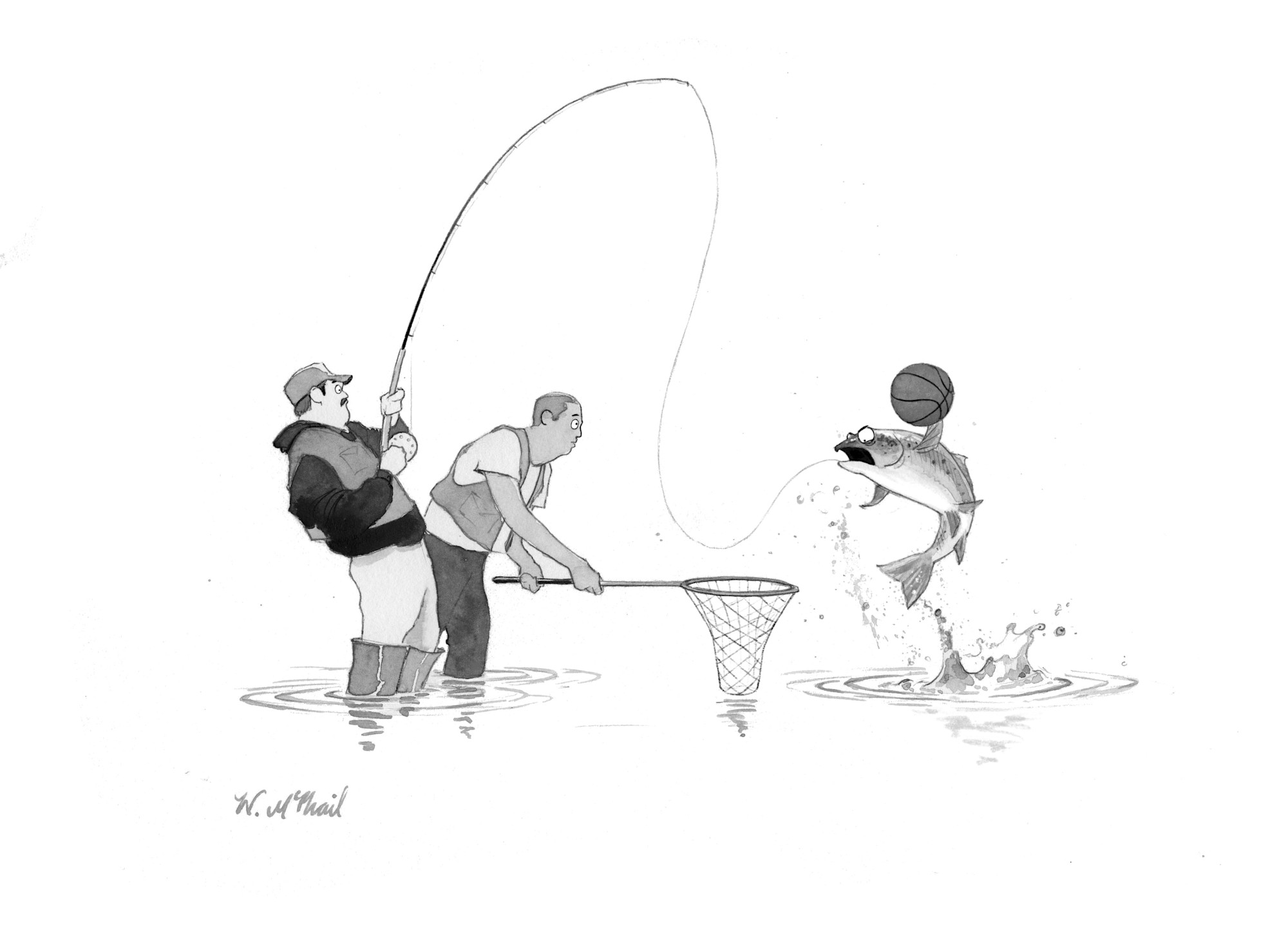
Here’s a question you never get: How can I be more funny?
You yourself, Chris? That is absolutely not a question I can answer. I'm trying to work that out all the time. Nobody knows. All I do is try and make myself laugh. You have to be selfish about it. If I can make myself laugh then I can carry on doing it. I’m enjoying my work and if it finds a group of people who also find it funny, that’s great too. Humour is just this magical thing that I’ve been reluctant to try and work out the science of so I can keep enjoying my work. It’s uncontrollable, and I like it to feel magic and undefinable.
OK, next question. Who is more complicated, animals or humans?
The zoologist in me says humans, but I prefer drawing animals.
Did you ever play The Sims?
Yes. Well, I’m a middle child so I watched my older brother play over his shoulder.
You can learn a lot about someone by the way they play The Sims.
Oh yeah, and we used to torture them! We built swimming pools and removed the ladders, deleted doors in rooms so they couldn’t get out then lit fires so they’d burn alive. We were just horrible little gremlins.
The last time we were able to go to a Halloween party I saw somebody with the costume that is the big green diamond on their head. I may have immediately fallen in love with them. It just made me want to push them in the pool and take the ladder out.
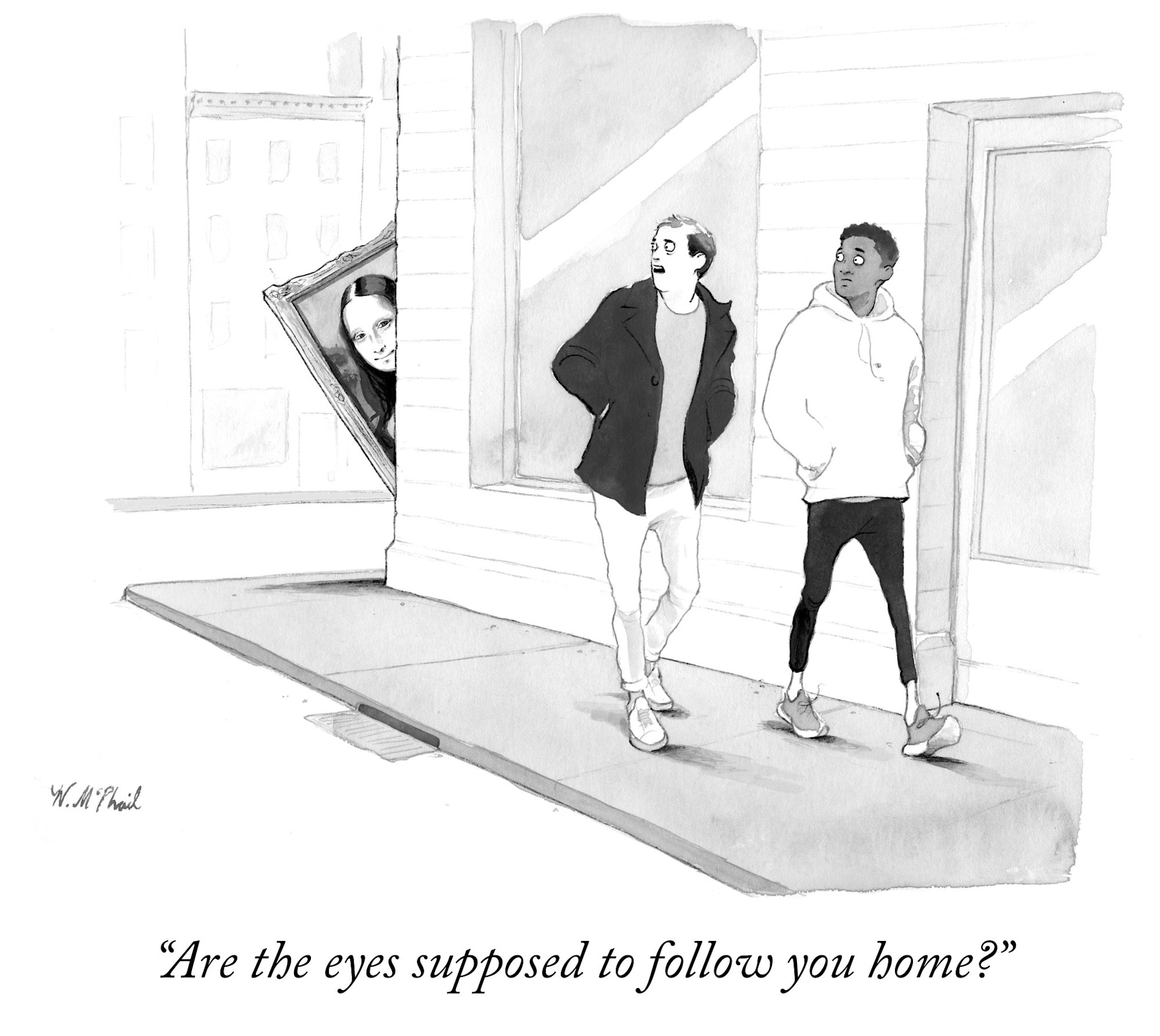
I want to paint a scene for you: It’s two years ago, 3AM in the morning, you’re at a bar and it’s dark and there are people everywhere. What are you paying attention to?
I think the dancing. I do love going out and dancing. And there's a moment when everyone's out where the dancing becomes authentic. It’s like a switch goes off. I don’t know if it’s the amount of alcohol that’s been consumed or just comfortability with the situation, but there’s a point where it feels performed, then boom everyone’s just genuinely loving the time. You can learn a lot about people once that switch happens.
What's more difficult, making someone laugh or making someone cry?
Making someone cry, for sure. That’s the holy grail for me! You can do both amazingly well, but making someone cry is the best. I mean, that’s my gauge of someone else's good work anyway.
Well, that leads well into talking about the book. And my first question on the book is did you mean to make me cry like that?
Haha! Well, I wanted it to be affecting in some way. There is this interesting topic I think about all the time from a podcast called POOG by Kate Berlant and Jacqueline Novak, these two geniuses. They were asking: should monuments to tragedies be beautiful? Like, knowing that something was really sad and trying to make the most beautiful thing out of it feels exploitative. That’s sometimes how I felt about trying to do a good job of making the book feel sad.
But again I was just following how I felt. If what I was writing was making me feel something then I would just let myself feel it and follow it through. The sad element was…I mean, I didn’t mean to write about loss and grief. I didn’t mean it! (laughs) But I just had this idea that people have these world’s within them, and the very next thought was that one of the world’s has to be lost. That was just too rich of an idea and too rich of a void to fill. And so yeah, it was just a case of me following the story where I felt it was leading me. And if that felt right, then I’m going to try and do as good a job with it as I can.
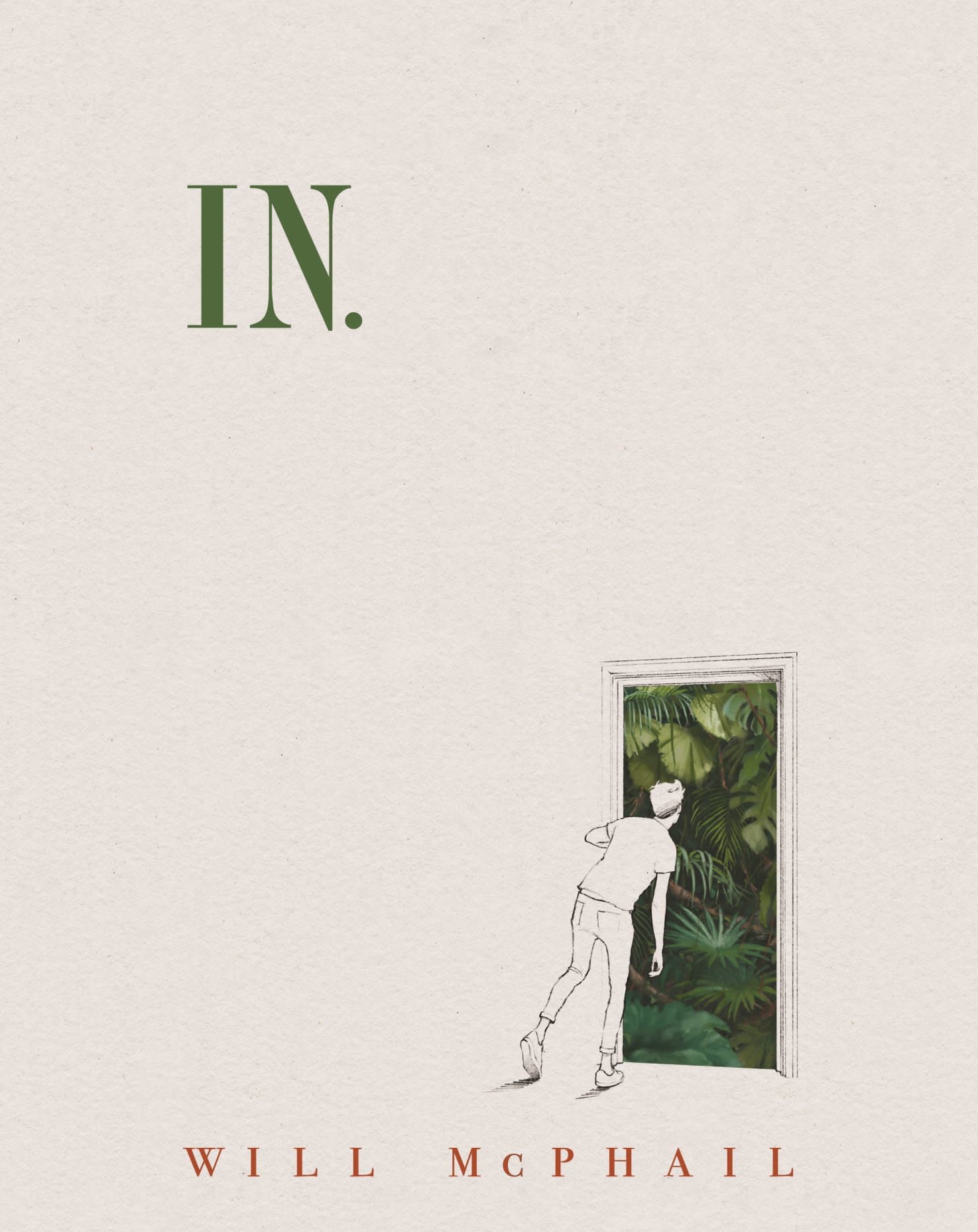
It’s also the first really long-form piece you’ve done. And of course I didn’t expect the book to be 200 pages of one-page comics, but it did play out differently than I expected. What was it like being given the freedom to go bigger with the pages?
At first, it was exactly that—freeing. Even literally with just space on the page, I’d never had that much space to work in. With single-panel stuff you’ve got to squeeze a premise, a setup, a punchline, a caption and a whole world in one frame. It’s a snapshot. with the book it felt like exhaling. I don’t have to be funny all the time. If there’s a joke to be made, I can take it slowly and consider a narrative that is still going 100 pages later.
But when I finished the book and went back to doing the New Yorker or whatever, I was like ‘oh THIS is freeing!’ I can write about pigeons or pistachio nuts and it doesn’t matter how it affects the story. It’s just a change of gears. Now that I’ve tried both it feels like one is a marathon and one’s a sprint. Too different muscles to flex.
It felt very immersive in two ways: One, there are these very minimal frames that say a lot by saying very little, like the external frames of Nick’s apartment. Then there are these enormous fully realised fictional world’s that are wonderfully experimental. There is this tension between the minimal and the maximal but they both achieve similar levels of immersion. Is this making sense?
Totally. Well I mean there’s all sorts of ways to break down the dynamic between the two. Initially it came from me trying to write around this idea that I’d found myself in conversations where I can hear myself saying things that I don’t care about just to get through the conversation unscathed. And when I could see the other person was doing that as well it’s like ‘what are we doing? Why are we doing this?’ And so when I’d seen in the few occasions of my life that I’d broken out of that, these transcendent conversations were completely different in their intimacy to whatever performance I’d been doing before.
I’ve never known how to explain how those conversations feel, so I thought I would draw it.
I’ve always been better at explaining complex ideas visually than verbally, and so these big colourful feverish pages are my attempt at that. Once I’d had that idea, I had to show the rest of it in contrast, so the black and white pages feel not boring enough but empty enough that people look forward to the colour pages. The balance that you’re talking about was trying to tell a story in an engaging way so that you could get through the book.

It's like the more mundane the interaction, the more real it felt. And I thought it was funny that it took this level of, of mundane-ness to illustrate an incredibly complex theme.
One of the biggest struggles I had throughout the book was pacing, because it would take me so long to draw a page and it takes the reader a fraction of a second to consume it. And so that was me kind of experimenting with how to slow the reader down and show them what’s important. I’d dedicate an entire page to a single frame, but there may have been 12 frames on the previous page, just to stop, slow it down and make the reader see things.
I want to talk about the role that hospitality plays in the book. The shopfronts are a really interesting exploration of typography and design and architecture, but they play a really important role thematically as well.
Initially, Nick is looking for this thing that he can't define and he thinks he's going to be able to find it in artisanal typefaces and nice shop fronts. The book was written by me between Edinburgh and New York but it doesn't really matter where it is; there are those kinds of coffee shops in every gentrified area of every city. The teasing of those pretentious coffee shops are jokes that I felt comfortable making because I do go to those places and I really like them (laughs).
That's how it started off, with Nick locking for something real amidst something very hollow. And just following the story where it led me, the coffee shops became a character in themselves and start communicating with Nick as the story goes on. They take him for granted, they know he’s addicted to them. And then when he starts to discover the real things in his life and cracks this connection, they start to get desperate and they're calling him back and pleading with him and then eventually consoling him right at the end.
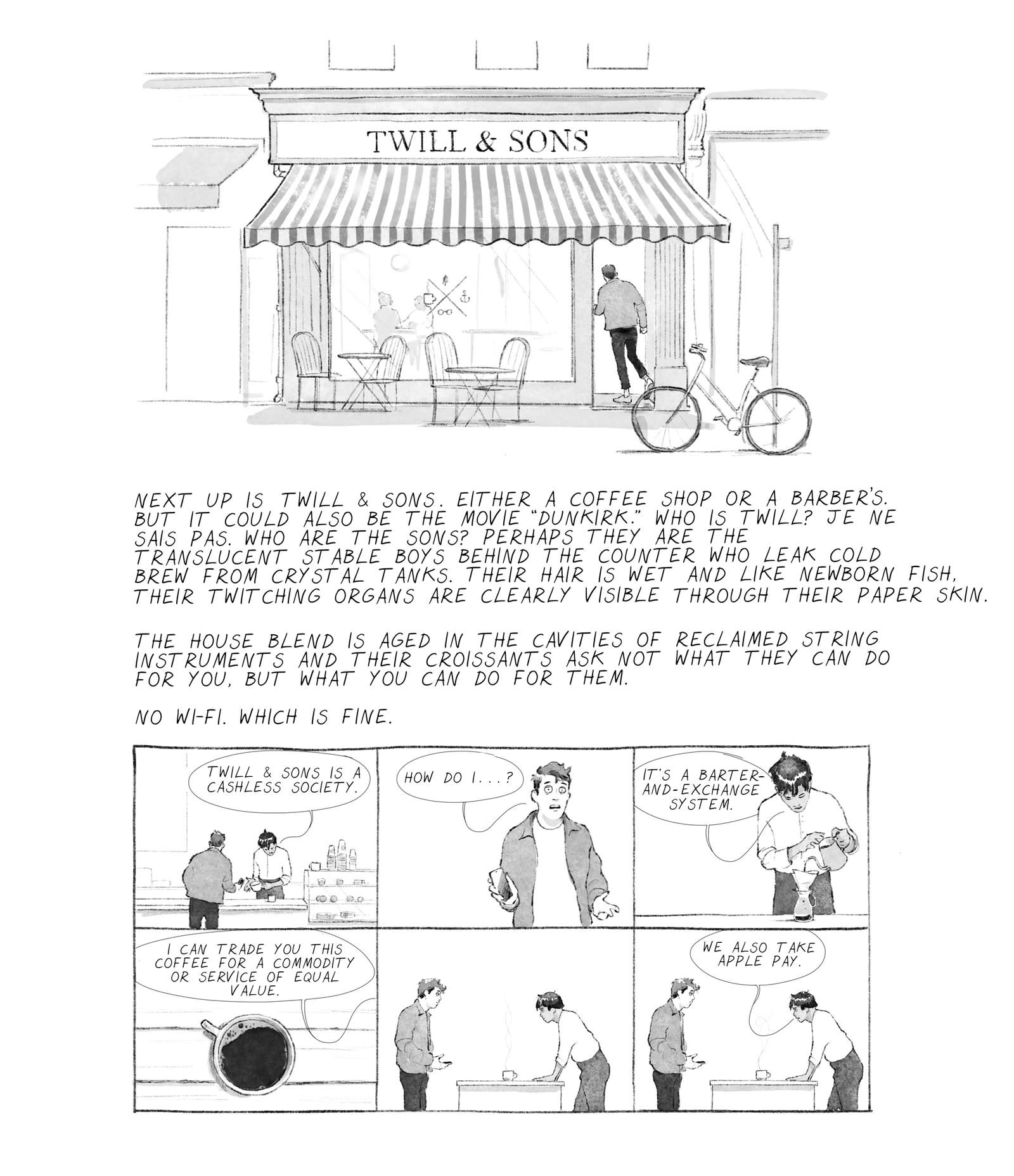
As I was reading, at first I thought ‘oh, this is a book that seems really relevant for a pre-COVID timeline. We just don’t really have that many mundane interactions right now. But then I thought like, ‘no, this is actually more like a manual for how to re-enter the world’. It reframed my take on it. Which timeline do you see in it?
The truth is that I wrote the book and signed it long before any of this. But the actual making of the book, the colouring and line work and everything was done in lockdown. That’s interesting what you said that it might be seen as a manual for coming out of lockdown. I guess that’s a nice way of looking at it.
And convenient!
Honestly, I’ve been reluctant to tie the book and the pandemic together. I don’t want to come across like ‘y’know that thing that killed your Grandma? I wrote a book during it! Pre-order now!’ I mean, I’d be lying if I said it hadn’t affected the way I was drawing while in isolation. A lot of my friends were directionless in isolation, whereas I had this book to finish. I knew what I had to do and when so it helped me deal with the pandemic as opposed to informing it.
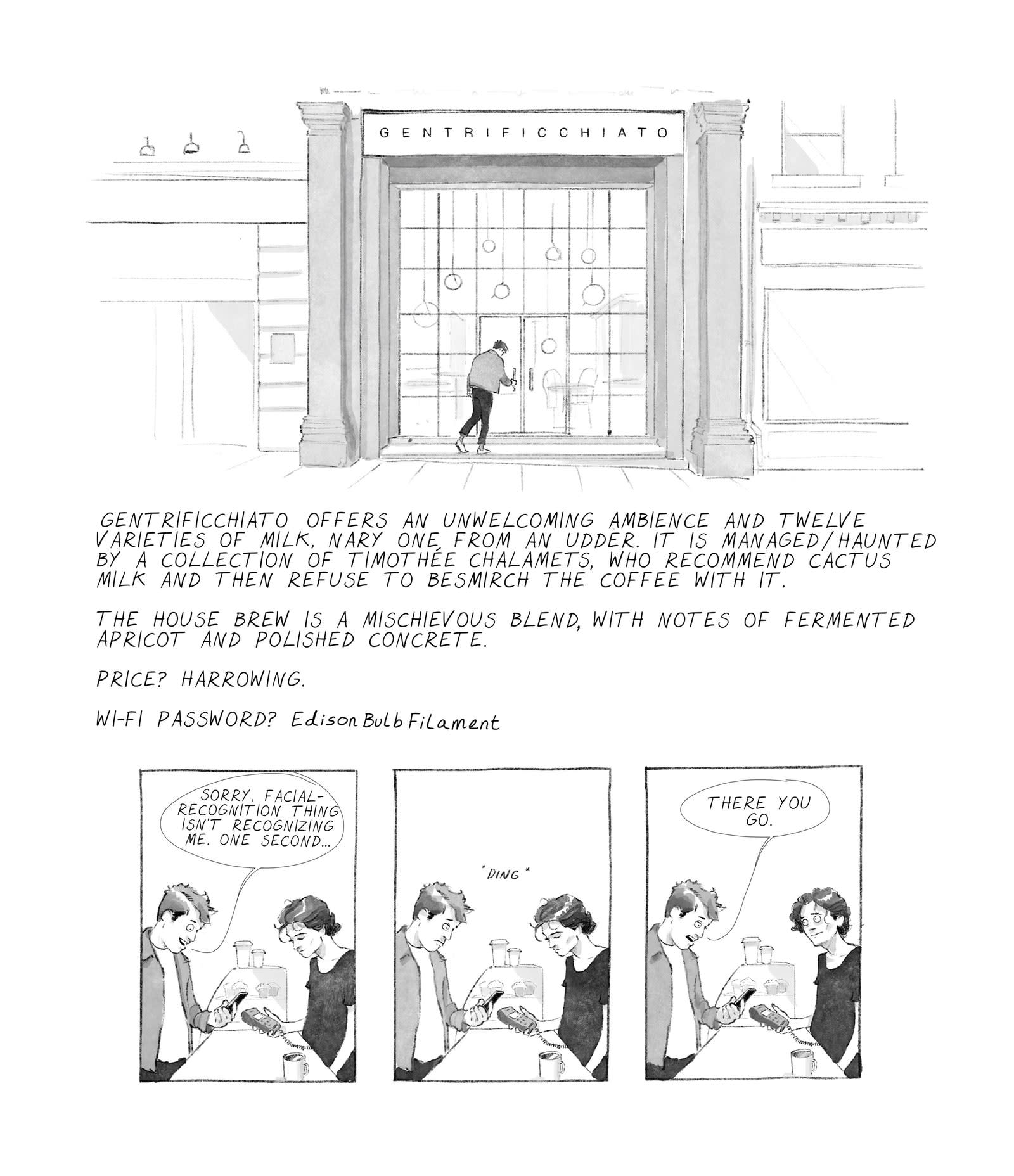
There is one part where Nick is considering his legacy, and that his notebooks are the only thing of value he might pass down to his children. Is that something you’ve thought about yourself?
I think people have said the publisher labelled In as semi-autobiographical. Nothing that happens in the book has happened to me. Of course, I’ve lost people I loved and I’ve had conversations that feel transcendent in their intimacy, but I’ve never connected with the plumber in my bathroom.
And the notebooks…yeah. I wanted to show the relationship between Nick and his mom that felt telepathic. Nick doesn’t know how he feels about something but his Mom does. She tells him how he feels. And I don’t have many possessions that I can pass on to people either.
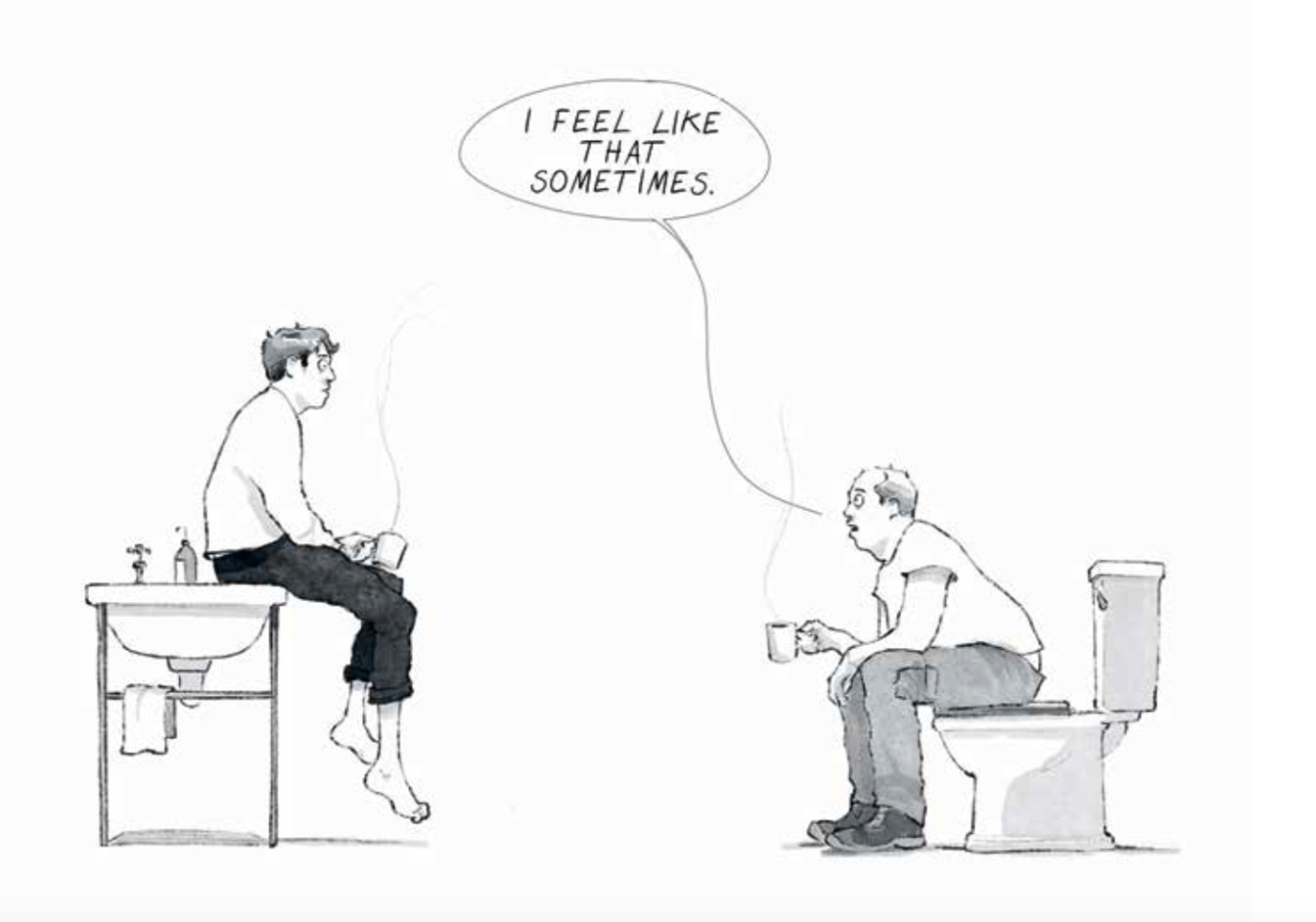
Now you have a book. And it’s real. It’s permanent, unlike a comic for magazine that is contextual and its relevance expires.
That’s true and that’s wonderful. But again that’s me retroactively applying things to my thinking. The truth is that my now-agent emailed me out of the blue one day and asked if I’d ever thought about writing a book. I lied and yes ‘yes! I think about it all the time. Thinking about it right now actually’ (I was probably thinking about pigeons). So we started coming up with ideas.
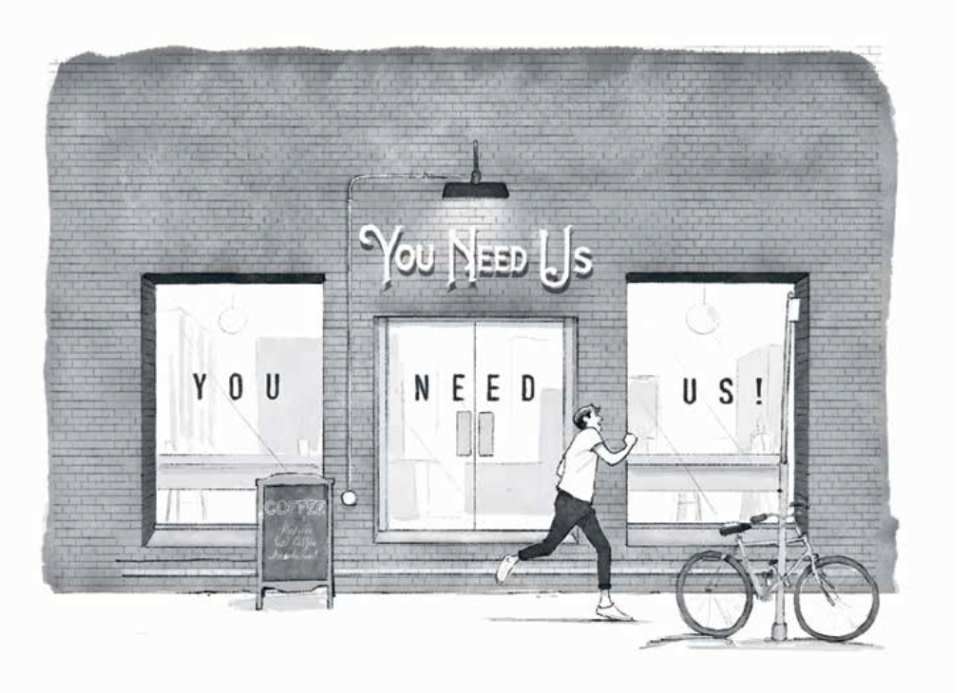
And I guess this goes back to our opening discussion about observation. How do you stop observing and just start living? Do your friends worry that you’re using them for material?
I think about it all the time. It’s funny, it’s usually the most boring people I’ve ever met who say ‘Don’t turn me into a comic! ’ But I thought about it for the book, because it promotes this idea of having meaningful conversations and I’m worried that people will come up and want to talk about death or illness with me. And I don’t want to do that all the time.
I’m not Nick in that respect. I don’t want intense, personal interactions all the time. I’m happy having those as they come naturally. And when they do, listening is just the most important thing. Everything is about listening and having the self awareness to just shut up. It’s so important, just shut up and listen!
I’m not Nick in that respect. I don’t want intense, personal interactions all the time. I’m happy having those as they come naturally. And when they do, listening is just the most important thing. Everything is about listening and having the self awareness to just shut up. It’s so important, just shut up and listen!
And listen in a way that isn’t exploitative.
Yeah. I mean, occasionally I get ideas that just feel like lightening bolts, fully formed. That happens maybe two-three times a year. Most of the time it's hard work. I find an area I'm interested in, then I'll chip away until I get to the right spot. Sometime's I'll think of like a good phrase or caption but isn't quite right for the image, so I get ride of the image and find a new one that morphs at its own pace.
It's an interesting topic. I really like football, and there is always this debate about who is better between Ronaldo and Messi. But it's almost this philosophical debate because one is this Demi-God that is just a pure conduit that graces us with his presence. And the other is someone who has gone through this level of sweat and tears and failure over and over and over again. So what do you value more—pure magical talent or the hard work that gets to the same position? As attractive as pure talent is, I think I value the hard worker more. It's important that people know you can get through it, and you can fail over and over again and just keep crafting yourself.